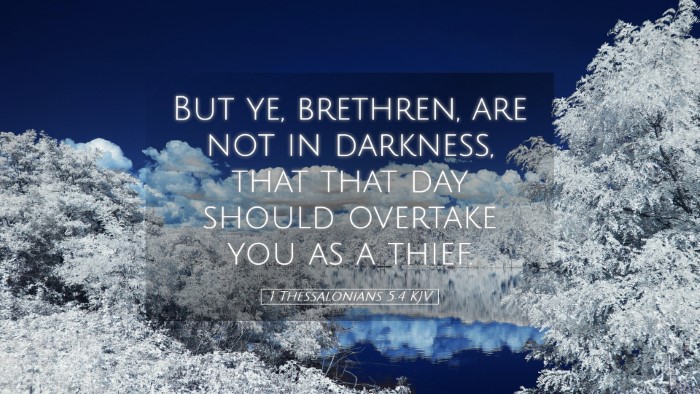Commentary on 1 Thessalonians 5:4
Verse: "But ye, brethren, are not in darkness, that that day should overtake you as a thief."
This verse is a profound declaration of the identity and position of believers in Christ. The Apostle Paul, writing to the Thessalonian church, reassures them of their standing in relation to the imminent return of the Lord. Let's delve into some insights from well-known public domain commentaries to gain a deeper understanding.
Contextual Analysis
Matthew Henry observes that the context of this passage lies in the Apostle's teaching about the Day of the Lord, which will come unexpectedly for those who are unprepared. Paul contrasts the spiritual states of believers and non-believers, highlighting a critical element: awareness.
- Spiritual Awareness: Believers are not in darkness; they possess the light of Christ.
- Preparedness: Unlike those who are ignorant of impending judgment, believers are called to vigilance and readiness.
Contrast Between Darkness and Light
Albert Barnes elaborates on the symbolic significance of darkness and light in Scripture. Darkness represents ignorance, sin, and separation from God. In contrast, light signifies knowledge, purity, and communion with the Divine.
- Identification of Believers: Paul identifies believers as "brethren," emphasizing their familial bond in Christ and their shared enlightenment.
- Implication of Being 'Not in Darkness': This implies that they have been enlightened by the gospel and are equipped to discern the times.
The Thief in the Night
Adam Clarke makes an interesting remark about the metaphor of a thief in the night, comparing it to an unexpected event that takes those unaware by surprise.
- Responsibility of Believers: Unlike the world, which is in a state of unpreparedness, believers are called to act in a manner consistent with their status as children of light.
- Growth in Spiritual Maturity: They are to grow in faith, understanding, and preparation, always ready for the return of Christ.
Theological Implications
This verse affirms the theological principle of election and assurance in salvation. As highlighted by Matthew Henry, the security of believers is founded in their relationship with God. They are assured that they are not caught off guard by the second coming of Christ because they are already enlightened and filled with the Spirit.
- Impartation of Knowledge: Believers have the Holy Spirit who guides them into all truth, thus equipping them to anticipate future events with confidence.
- The Day of the Lord: This emphasis on awareness invites us to interpret the 'Day of the Lord' not merely as a point of eschatology but as an invitation to live expectantly in holiness and vigilance.
Practical Application
How can this verse influence the everyday lives of Christians? It serves as a powerful reminder to live in a way that reflects our understanding of God’s revelation through Jesus Christ. Here are some practical points:
- Vigilance in Living: Believers are called to live thoughtfully and intentionally, taking every opportunity to grow in Christlikeness and spread the gospel.
- Community Bonding: The term 'brethren' denotes unity. It encourages churches to foster relationships that remind each other of their shared hope and responsibilities.
- Proclaiming the Truth: Acknowledging our identity requires sharing it. Believers are tasked with proclaiming Christ and engaging with those who dwell in darkness.
Conclusion
1 Thessalonians 5:4 is a succinct yet profound reminder of the difference between the believer and the non-believer in the context of end-time events. Paul’s assurance to the Thessalonian church resonates through the ages, emphasizing that Christians live in the light of truth and not in the shadows of ignorance.
May this commentary serve as an encouragement to all who read it, urging them to embrace their identity as children of light and to act accordingly in anticipation of Christ's return.


